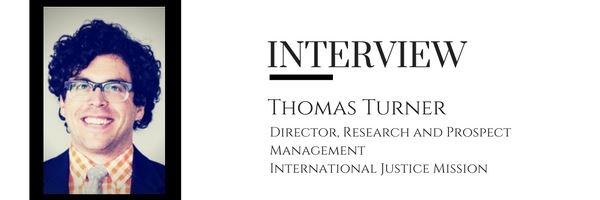

What makes Prospect Development a great career?
APRA-IL is asking local and national industry leaders what the field means to them and why and how they have pursued success in Prospect Development. Through this blog series we will explore what drives industry leaders to propel their careers and Prospect Development forward.
For this month's piece, Joan Ogwumike, APRA-IL member and volunteer, interviews Thomas Turner of the International Justice Mission.
![]()


Thomas Turner is the Director, Research and Prospect Management at International Justice Mission (IJM), an international human rights organization focused on ending slavery and everyday violence. Prior to launching prospect research at IJM in 2012, Turner was a Compliance Manager at KPMG, where he worked on SEC independence and compliance issues.
Mr. Turner is a member of APRA International and serves on the APRA DC board. He has presented previously at APRA DC, APRA Maryland, MARC and APRA International.
Some of Mr. Turner's answers have been paraphrased.
![]()
APRA-IL: What impact does your work, and the overall field of Prospect Development have? (And could you describe who you believe your audience is?)
Turner: My audience would be a general APRA audience. Research, Data Analytics, Advancement Services and Relationship Management.
I like to describe Prospect Development as the nucleus of a department. Prospect development can serve as a centralized resource that helps the disparate units that make up advancement run effectively when it is set up well for success by leadership and given the opportunity to work with the many teams of the advancement division., This happens through excellent research, pragmatic and data-driven relationship management, and, increasingly, data analytics that tests, validates, and implements successful insights into your business. In my own work, I try to follow a personal motto that, when confronted with a problem, it is an opportunity to be “just another thing we can make better.” I think that a few prospect development shops have made to move into a consulting role is definitely the right call. It gives the prospect development shop the level of appreciation it deserves.
APRA-IL: Describe your motivations in this field, and what keeps you engaged.
Turner: I am always motivated by success stories. For me, my success is directly tied to success for my colleagues in the field and the clients we serve. As much as I love to solve puzzles --- and really, Prospect Development is a game when you think of it --- and finding that needle in a haystack, that is a motivation that can get me from task to task. My motivation is give 100% to my work, and to remember that when I can do as much as possible to grow my organization’s donor base- literal lives are being changed- widows who will have their property given back to them, children removed from abusive situations, people like you and me freed from modern day slavery.
The people in the Prospect Development industry keep me engaged. When I transitioned from the corporate world to the non-profit world, I was astonished by the lack of competition in the research industry. The comradery and helpfulness of professionals in prospect development is unparalleled. I would not have had opportunities to speak, to grow, to build my shop at IJM if I was not part of a prospect development community that is so willing to share best practices. It is an honor to be part of the community and it motivates me to give back, since so much was given to me.
APRA-IL: What advice would give a new professional in the field of Prospect Development?
Turner: I think the best thing you can do is join your local APRA chapter. You will join a community of people that will help you grow and who will respond to questions you have. It is an invaluable source to have colleagues in the industry you can reach out to when you are stuck or have a question or need advice on your career growth.
I really encourage analysts to know their primary sources. When you land your first research or relationship management job, you are handed a subset of data and a few proprietary tools that filter external data and match it with your subset. Learn how your entire database is constructed so that you know how to interact with it beyond what you have been instructed to do in your new position. Along those same lines, I think it is really important to know what is behind your proprietary tools. Knowing how to read a 10-K, a form 990, a FEC filing, a real estate deed, and a business registration will build your critical thinking skills far faster than just taking the summary or snapshot a tool gives you. When I started in prospect development, my skepticism and critical thinking advanced because I learned the weak spots in the tools we had. I figured out how to discern the quality of information since certain primary sources can be poorly interpreted by those tools. Go learn how to use EDGAR and the FEC database. It will be fun and help you grow!
![]()
![]()
Do you know a leader you want us to profile? Let us know! Email us at info@apraillinois.org
